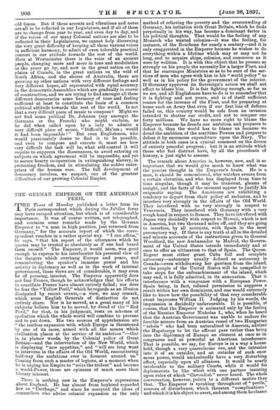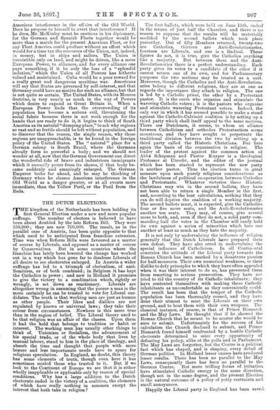THE GERMAN EMPEROR ON THE AMERICAN PERIL.
THE Times of Monday published a letter from its Paris correspondent which during the Jubilee fever may have escaped attention, but which is of considerable importance. It was of course written, not telegraphed, and contains some remarks made by the German Emperor to "a man in high position, just returned from Germany," for the accurate report of which the corre- spondent vouches in a rather special way. "I can affirm," he says, "that his report of the utterances which he quotes may be trusted as absolutely as if one had heard them oneself." The Emperor, it would seem, was good enough to express to his interlocutor his personal view of the dangers which overhang Europe and peace, and remembering the speaker's immense power and his activity in diplomacy as well as in the work of internal government, those views are of considerable, it may even be of pressing, interest. The Emperor apparently does not fear France, though he acknowledges that his efforts to conciliate France have almost entirely failed; nor does he fear the "Yellow Peril," which he regards as an illusion dissipated by recent events,—a view, we may remark, which some English Generals of distinction do not entirely share. Nor is he moved, as a great many of his subjects believe him to be moved, by dread of the "Red Peril," for that, in his judgment, rests on schemes of spoliation which the whole world will combine to prevent and to put down. His two sources of apprehension are " the restless expansion with which Europe is threatened by one of its races, armed with all the means which civilisation places at the service of its ambition "—that is, in plainer words, by the Colonial policy of Great Britain—and the intervention of the New World, which is displaying "new appetites," and "will ere long want to intervene in the affairs of the Old World, encountering half-way the ambitions ever in ferment around us." Coming from such a master of legions, at a moment when he is urging his Empire to "seize the trident" and become a world-Power, those are opinions of much more than literary interest.
There is nothing new in the Emperor's expressions about England. He has almost from boyhood regarded her as "Carthage," and since he accepted the ideas of .counsellors who advise colonial expansion as the only method of relieving the poverty and the overcrowding of Germany, his irritation with Great Britain, which he finds perpetually in his way, has become a dominant factor in his political thoughts. That would be the feeling of any Monarch who wanted colonies—it was the feeling, for instance, of the Bourbons for nearly a century—and it is only exaggerated in the Emperor because he wishes to do everything within a lifetime which may or may not be long, and to acquire ships, colonies, and commerce as it were by volition. It is with this object that he presses so strongly on his people the necessity for a larger Fleet, and that he rearranges Ministries so as to be sure of the ser- vices of men who agree with him in his "world policy" as well as in his policy for the government of the interior. If Germany approves its Sovereign's action we shall not affect to blame him. It is fair fighting enough, so far as we see, and all Englishmen have to do is to remember that it is fighting and not peace, and is of itself sufficient reason for the increase of the Fleet, and for preparing at home such an Army that even if our first line of defence failed us, this country would be safe from an invasion intended to shatter our credit, and not to conquer our forty millions. We have no more right to blame the Emperor because he dreads our ambition and prepares to defeat it, than the world has to blame us because we dread the ambition of the maritime Powers and prepare to defeat it by enormous expenditure upon the Navy. The attitude in both cases is a, cynical comment on the dream of entirely peaceful progress ; but it is an attitude which those who feel distrust have, by all the precedents of history, a just right to assume.
The remark about America is, however, new, and is so important that we would give much to know what was the precise thought in the Emperor's brain. He is a man, it should be remembered, who watches events from a certain elevation, and who has displayed from time to time singular, though it may be transient, gleams of insight, and the facts of the moment appear to justify his enigmatic saying. The Americans are exhibiting a tendency to depart from their policy of seclusion, and to interfere very strongly in the affairs of the Old World. They interfered with us very strongly in respect to Venezuela. They interfered with Germany with a very rough hand in respect to Samoa. They have interfered with Japan very decidedly with respect to Hawaii, which is not in America, but two thousand miles off, and they are going to interfere, by all accounts, with Spain in the most peremptory way. If there is any truth at all in the detailed and minute accounts of the instructions given to General Woodford, the new Ambassador to Madrid, the Govern- ment of the United States intends immediately and at once to offer an ultimatum to that of Spain. The Queen- Regent must either grant Cuba full and complete autonomy—autonomy usually defined as autonomy in Canada—even withdrawing her garrison from the island, or the people of the United States will be compelled to take steps for the enfranchisement of the island, which may end, it is fully admitted, in its annexation. That is interference with a vengeance with a European Power. Spain being, in fact, refused permission to suppress a revolt within her own dominions, and one would extremely like to know how the possibility of that very considerable event impresses William II. Judging by his words, the impression is decidedly unfavourable. It is possible, of course, that the Emperor is animated only by the feeling of the Russian Emperor Nicholas I., who, when he heard that the Austrian Government was unable to endure the forcible seizure from an Austrian vessel of two Hungarian " rebels " who had been naturalised in America, advised the Hapsburgs to let the affront pass rather than bring into the diplomacy of Europe an element at once so in. congruous and so powerful as American interference, That is possible, we say, for Europe is in a way a house- hold, though a very quarrelsome one, and the intrusion into it of an outsider, and an outsider of such enor mous power, would undoubtedly have a very disturbing effect, especially upon all alliances. It would be nearly intolerable to the military Courts, while it would fox diplomatists be like whist with one partner insisting upon rules of which "Cavendish" never heard. The whole conversation, however, points to a different motive than,. that. The Emperor is speaking throughout of " sources of disturbance, which threaten "complications and which it is his object to avert, and among them he classes American interference in the affairs of the Old World. Does he propose to himself to avert that interference ? If he does, Mr. McKinley must be cautious in his diplomacy, for the German and Spanish Fleets together would be more than a match for the present American Fleet, or for any Fleet America could produce without an effort which would for a time tax the resources of the Union, not, indeed, in money, but in ships and sailors. The Union is irresistible only on land, and might be driven, like a mere European Power, to alliances and for every alliance one pays something, if it be only the loss of a "splendid isolation," which the Union of all Powers has hitherto valued and maintained. Cuba would be a poor reward for a really great and dangerous maritime war. Americans will say that States are governed by self-interest, and that Germany could have no motive for such an alliance, but that is not quite so certain. The United States, with its Monroe doctrine, is very nearly as much in the way of Powers which desire to expand as Great Britain is. When a European Power finds that the overcrowding of its population has become a serious evil, threatening the social fabric because there is not work enough for the hands that are ready to do it, it begins to think of South America as its natural "dumping place," to ask why regions so vast and so fertile should be left without population, and to discover that the reason, the single reason, why those regions are unapproachable, is to be foundin the foreign policy of the United States. The " natural " place for a German colony is South Brazil, where the Germans already form so powerful a body ; and we should not wonder at all, now that the German Government can direct the wonderful tide of brave and industrious immigrants which it annually pours from its shores, if that body be- came suddenly and amazingly enlarged. The German Emperor looks far ahead, and he may be thinking of Germany when he classes American interference in the Old World as a danger greater, or at all events more immediate, than the Yellow Peril, or the Peril from the Reds.



















































 Previous page
Previous page